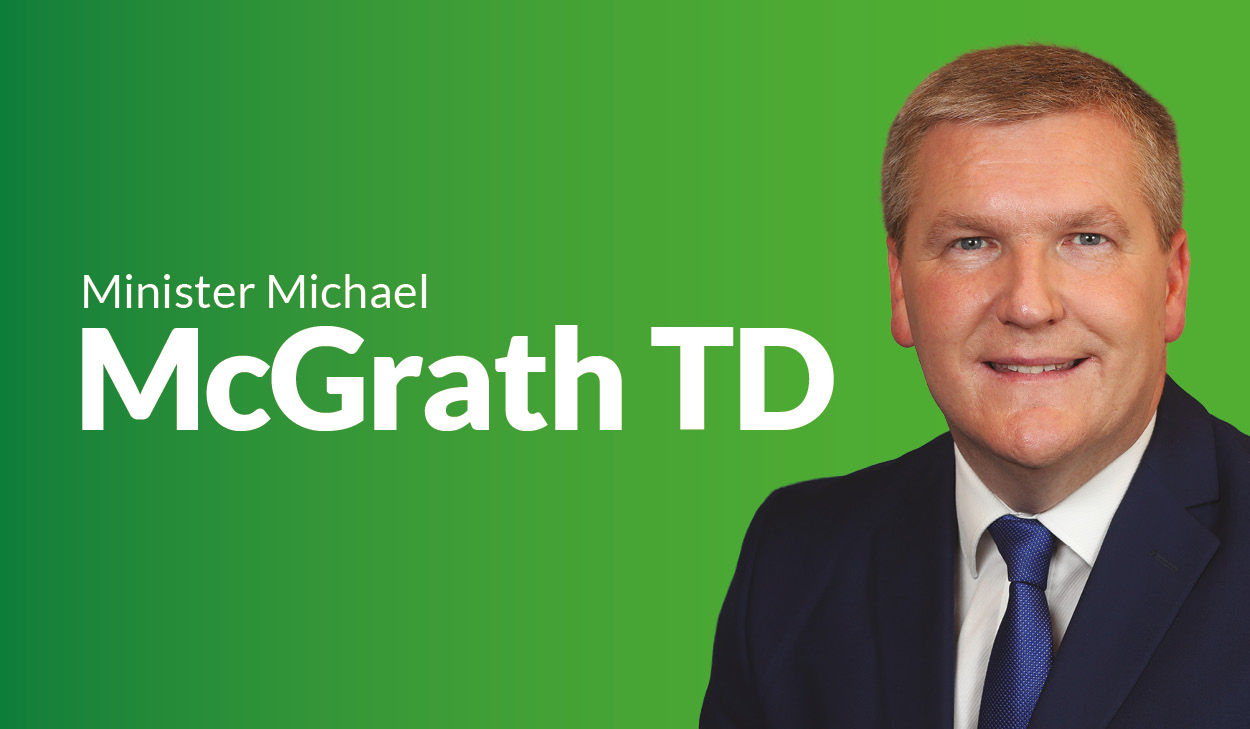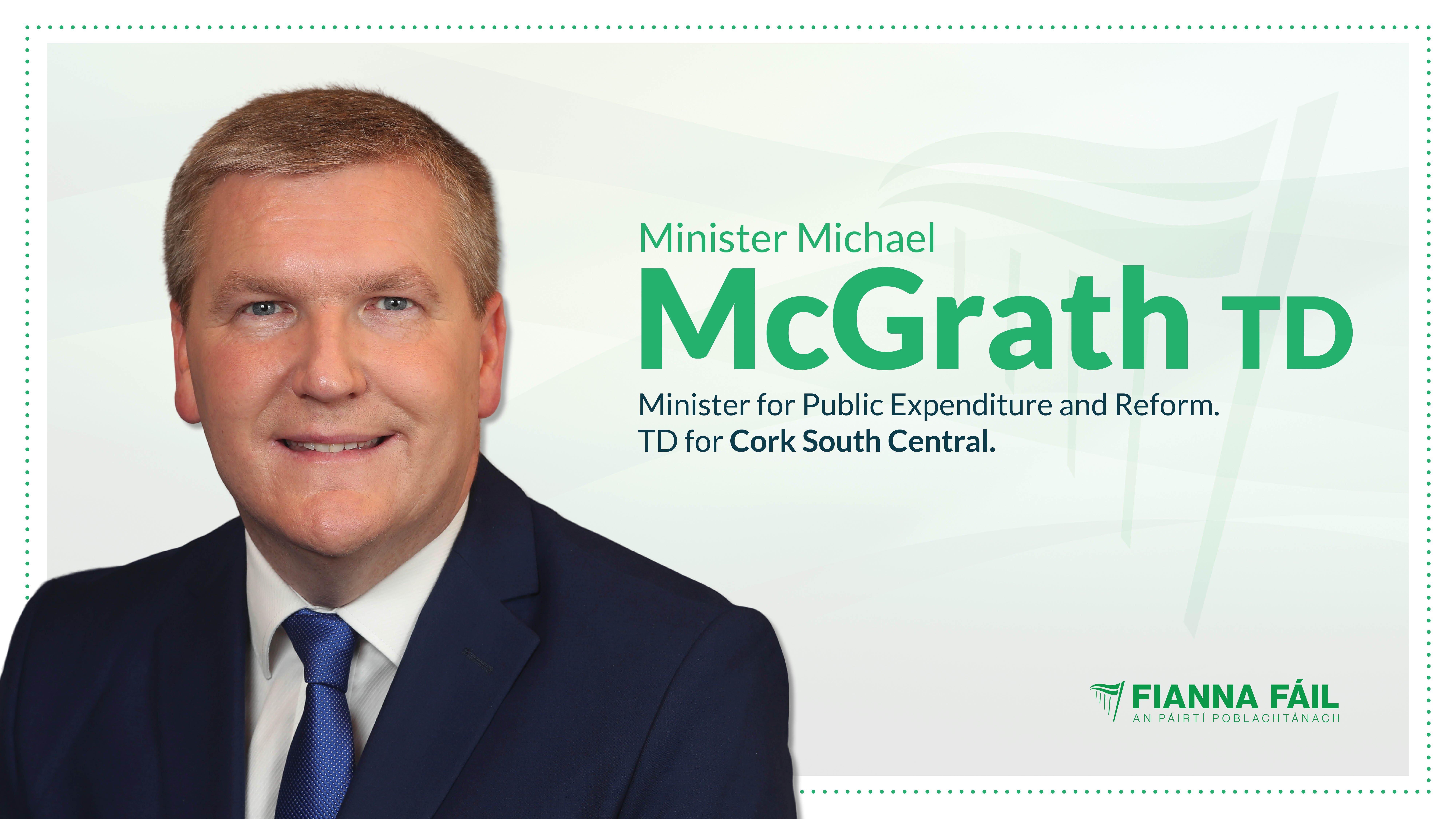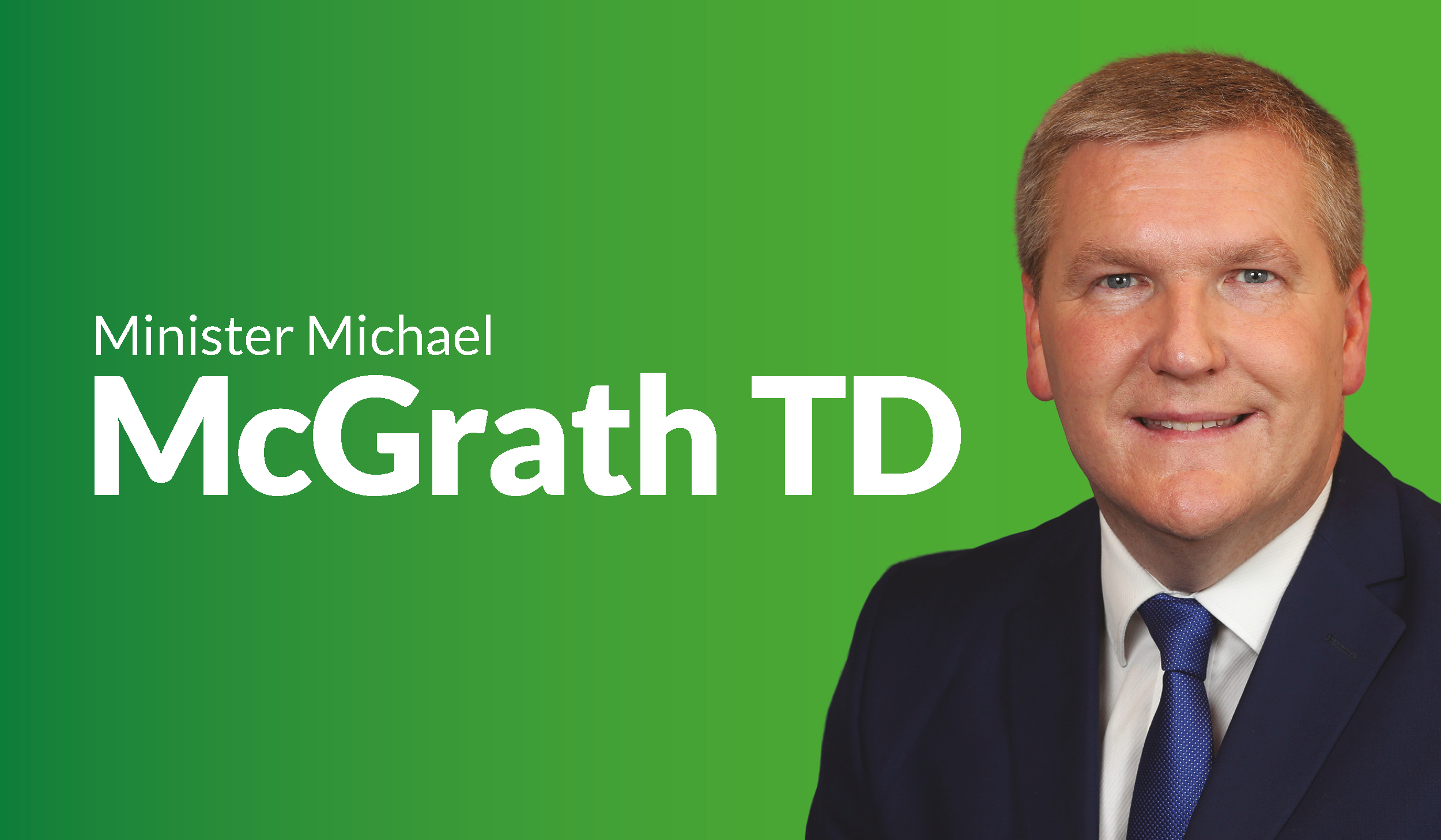Minister McGrath's Speech at the National Economic Dialogue, 2022
Published on: 24 June 2022
Good morning and welcome to everyone.
The National Economic Dialogue is an important milestone in our budgetary timetable where we meet together to take stock, reflect, and consider priorities for the coming Budget. In the two years since we last convened ‘in person’, we have faced enormous challenges and uncertainty with the unprecedented scale and impact of the COVID-19 pandemic.
While the worst of the pandemic appears now to be behind us, we face new challenges as the war in Ukraine impacts commodity prices, the global supply chain and the wider economy. We have seen over 36,000 displaced persons seek refuge in the State and providing humanitarian support for them is a key priority.
In this context, the theme for today’s Dialogue is one that encompasses all these concerns. As a small, open, trading economy, we have always been mindful that events beyond our shores and outside of our control can have major impacts on our citizens and public finances.
And while we cannot insulate ourselves against all global shocks, we can ensure that our economy is resilient and that public finances remain on a sustainable path over the medium term.
Economic Context
The actions taken by the Government and supports put in place during Covid have ensured the economy was protected throughout this difficult period.
Since the onset of the pandemic, Government has made available €37 billion to provide for direct expenditure measures to support our key public services in responding to the challenges of Covid-19 and to provide the necessary income and employment supports to our people and businesses.
The funding has also directly supported the incomes of around 880,000 people through the Pandemic Unemployment Payment and around 725,000 jobs through the Employment Wage Subsidy Scheme over the course of the pandemic.
As we emerge from Covid our economy and labour market are recovering. Unemployment stood at just 4.7% in May, with CSO figures showing that over 2.5 million people are now in employment. Over 150,000 more people are employed now than immediately prior to the pandemic.
Expenditure Context
Budget 2022 set out an expenditure allocation of €87.6 billion for delivery of public services. This figure included an unallocated contingency reserve of €3.9 billion.
Each year on Budget Day, attention is primarily focused on new current expenditure measures and increases in funding that are necessary to maintain existing level of services. While these changes in expenditure are important, it should be noted that in 2022 new current measures accounted for €1.5 billion of the overall core budget allocation of €80.1 billion.
Clearly, the vast majority of public expenditure supports the provision of ongoing current expenditure and capital investment. It is important to keep sight of the totality of public spending rather than the incremental amount added each year, and ensure that the overall level of expenditure remains affordable over the longer term and delivers sustainable improvements in public services and infrastructure.
While the economic recovery is strong, pressures are continuing in relation to the provision of COVID-related supports in certain sectors, the humanitarian response to the war in Ukraine and the recent increases in the cost of living.
Providing for the humanitarian needs of Ukrainian refugees arriving in Ireland will require substantial resources. In the Stability Programme Update, published in April, contingency funding of €3 billion was indicated for 2023 to meet these costs. The exact level of expenditure will depend on a number of factors, including the total number of arrivals and the accommodation solutions. This is an evolving situation and cost estimates will update over time as more information becomes known.
Cost of Living
All of us in government are acutely aware of the impact on people, businesses, and wider society, of the increase in consumer prices in recent months, especially the increase in fuel and other energy costs. This increase in inflation is not a problem unique to Ireland. Supply chain issues related to the pandemic are a considerable factor, with the war in Ukraine exacerbating the impact on energy prices.
Budget 2022 set out a €1.2 billion package of expenditure measures to support citizens across a range of sectors with cost of living pressures.
Headline measures included increases in weekly social protection payments, the Fuel Allowance and Working Family Payment; health affordability measures; social and affordable housing funding, and enhanced student and childcare supports. Budget 2022 also contained an income tax package of just over half a billion euro.
While public resources cannot be deployed at the scale that would be needed to fully compensate for all cost increases, the Government has committed significant resources to mitigate cost of living issues,
targeted at the main underlying problem of higher energy prices and with additional assistance to those most vulnerable.
Since December 2021, over half a billion euro of additional expenditure measures alone have been put in place to support citizens and businesses with increased costs. This funding supported a range of measures including:
- the Electricity Credit payment applied to the electricity bill of all domestic account holders.
- two lump sum payments totalling €225 paid in March and in mid-May, benefiting over 370,000 households in receipt of Fuel Allowance. This is in addition to the €5 per week increase in Fuel Allowance payments introduced with effect from Budget night last year.
In addition, reductions in excise duty on petrol and diesel and VAT on electricity and gas bills are providing ongoing relief to consumers.
As we approach Budget 2023, we will have to factor in the increasingly challenging and complex economic context. We must strike a balance between delivering targeted support, capable of timely implementation which are temporary in nature to ensure that our public finances remain on sustainable trajectory and avoid actions that could result in further inflation.
Pressures on Capital Projects
The National Development Plan published in October 2021 provides a detailed and positive vision for Ireland over the next 10 years, and sees total public investment of €165 billion over the period 2021-2030.
The NDP is the largest in the history of the State with Ireland’s annual capital investment budget now among the largest across EU countries. This year, in 2022, over €12 billion is available to spend on vital infrastructure in areas such as housing, transport, education, enterprise, sport and climate action. It will be a pivotal year in consolidating the progress already made, and, most importantly, delivering the infrastructure to support our future climate, social and economic requirements.
I am conscious of the challenges to the delivery of NDP posed by the increases in the prices of construction materials in the aftermath of the pandemic and as a result of the Russian invasion of Ukraine. In the interest of safeguarding public projects that are already under construction and to mitigate the risks of significant losses being sustained by contractors, I announced in May details of the “Inflation Co-operation Framework" for those parties engaged under a public works contract.
The measures available under the Framework strike an important balance between the additional costs incurred by contractors and the State’s need to deliver the NDP, whilst maximising value for money for the taxpayer.
Towards Budget 2023
As Budget 2023 approaches, a careful balance will need to be struck between meeting the various demands on the Exchequer and ensuring we manage the public finances in a responsible manner.
Resources are limited, and with every decision made at Budget time there are trade-offs to be considered. We will need to be mindful of that in our discussions today.
Minister Donohoe and I are currently engaged in preparations for this year's Summer Economic Statement. The challenging economic context is adding complexity to the formulation of our fiscal strategy for 2023. Central Banks around the world are now moving quite quickly in increasing interest rates and tightening monetary policy. This will impact households but also the State’s finances as the cost of borrowing begins to climb.
In finalising the budgetary parameters, we will seek to strike a balance between helping to mitigate cost of living pressures and ensuring sustainability of the public finances. Overall we aim to design policy to protect the most vulnerable in society while also ensuring measures do not add to inflationary pressures. The Summer Economic Statement and the Mid-Year Expenditure Report will be published in the coming weeks.
In relation to public service pay, I believe it is in the interests of all parties to reach agreement on pay arrangements for the remainder of this year and next year if at all possible. A collective agreement helps to bring industrial peace and, given that that public sector pay accounts for about one third of current expenditure, provides certainty about a large proportion of public spending.
I accept that the current level of inflation has impacted on the living standards on public service and private sector workers, and pay improvements beyond the terms of the current agreement are warranted for our public servants.
However, we cannot expect pay alone to fully offset the impact of inflation. Pay is only one lever available to the government, and account also has to be taken of the other interventions the government has made and will make in the Budget. In the light of the growing global economic uncertainty, the rising cost of borrowing, and significant emerging spending pressures, we have to ensure any pay deal is affordable and sustainable into the future.
Conclusion
In conclusion, sustainability in expenditure is not just about ensuring that overall level of spending is affordable in the long term. It also means ensuring that spending delivers sustainable improvements in public services and infrastructure. We must build on the budgetary reforms already in place to ensure spending delivers efficiency, effectiveness and value for money.
I look forward to constructive and fruitful discussion over the course of the day.


